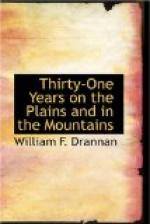I hired to Gen. Crook for one hundred and twenty-five dollars per month, to go to work the following morning. After the bargain was made the General said to me: “You must bear in mind that you’re in a different country now to what you have been accustomed to working in, and altogether a different climate as well.” He proposed sending a man with me that he said was thoroughly posted in the country, knowing every watering place, as well as the different runways of the Indians in the whole, country, and he added that he would not expect any benefit from us for at least ten days, as it would take this man that length of time to show us over the country.
At this I withdrew from the General’s quarters, and he and George soon made a bargain. George was to receive seventy-five dollars per month. The balance of the day was spent in making preparations for our prospecting tour, as we termed it.
CHAPTER XXIX.
Find some murdered emigrants.—We bury the dead and follow and scalp the Indians.—Gen. Crook is pleased with the outcome.—A Mojave blanket.
The following morning I ordered ten days’ rations for three of us. When we were ready to start Gen. Crook called me aside and told me the nature of the man who was to accompany us, saying that there was not a watering place nor an Indian trail in the whole territory that he did not know, and said he: “If you don’t see any Indians or fresh sign of Indians he will show you all over the country. But he is the scariest man of Indians you ever saw in your life.”
This man’s name was Freeman. When we were ready to start Freeman asked me what course I wished to take. I told him that I would like to go in the direction that we would be the most likely to find Apaches. I pointed in the direction of a range of mountains, telling him that by ascending them he would be able to show me where the different watering places were in the valley by land marks, and we struck out southeast from the fort in the direction of the middle fork of the Gila river. The first night we camped on what was then called the Butterfield route, some thirty-five or forty miles from the fort. This season there were a great many emigrants passing over this route from Texas and Arkansas to California, and Gen. Crook said the Apaches were giving them much trouble on this part of the road, and if they continued to be so bad he would have to send one or two companies of soldiers out there for the protection of the emigrants. The second morning out we passed a ranch owned by a man named Davis, who had lived there two years. He told me that the Apaches had never given him any trouble from the fact that he had gotten the good will of the chief when he first went there by giving him numerous little presents of different kinds.




